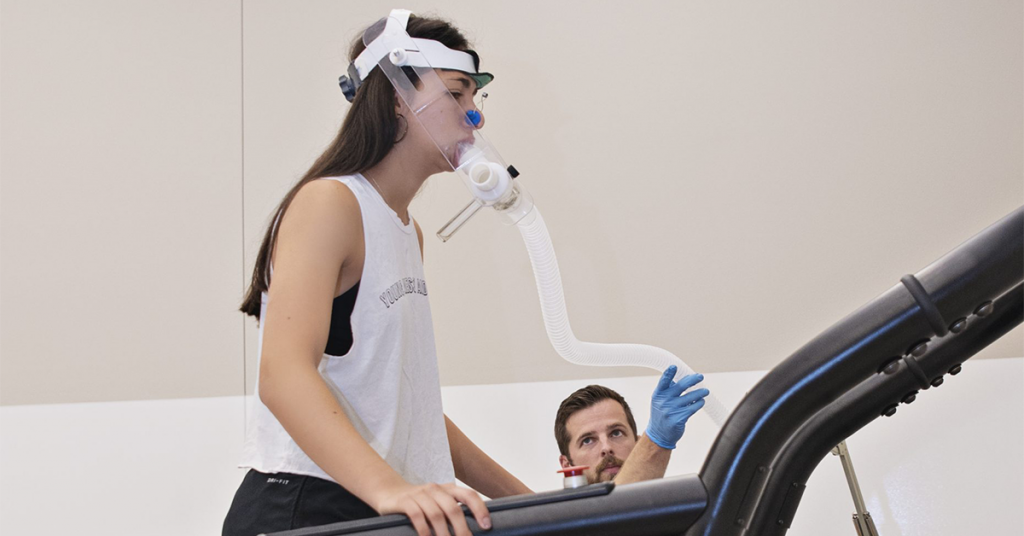Louisiana State University Shreveport’s $1.2 million investment in a new state-of-the-art Human Performance Lab will soon provide pathways for increased research potential, new teaching opportunities and revenue generating community engagement.
The HPL, once completed, will offer the only environmental chamber for human data collection in the state of Louisiana, as well as industry-standard equipment and over 20 different assessment opportunities. After years devoted to personal training, strength and conditioning training, and specifically, environmental stress research, Assistant Professor and HPL Director, Dr. Cory Coehoorn is excited to expand LSUS’s exercise science capabilities.
“I am very passionate about environmental stress research,” Dr. Coehoorn said. “It’s an extremely important field that requires rapid advancement. There’s not enough known about how environmental stressors impact the body, and LSUS will unquestionably establish itself as a premier research center in environmental stress due to its investment in the new environmental chamber.”
The HPL will be made up of three separate but integrated rooms featuring cutting-edge equipment and professional staff with years of combined academic and applied experience. The Exercise Science Lab, Motion Analysis Lab, and Motor Behavior Lab are designed to create a national resource for human performance research including assessments which measure oxygen consumption, aerobic capacity, temperature tolerance, body fat percentage, motor control, visual tracking, biofeedback, reactivity, brain activity, and more.
The Exercise Science Lab will be anchored by a 20-foot by 10-foot environmental chamber, the only one of its kind in the region. Projected to be available in January 2022, the chamber will enable research related to human performance in variable climates, humidity percentages, and altitudes. Its research potential expands into exercise and environment physiology, human thermoregulation, temperature stress on vulnerable populations such as geriatric chronic disease, worker health and safety in adverse environments, heat management, and monitoring technologies. The Motion Analysis Lab features state-of-the-art Vicon motion analysis capture cameras as well as AMTI force plates to measure both kinematics and kinetics. Finally, the Motor Behavior Lab is used to analyze and train the central and peripheral nervous system as they relate movement and perception.
“Each of the labs that make up the Human Performance Lab allow it to be holistic,” Dr. Coehoorn said. “With all three spaces, we will have the ability to analyze an individual from a physiological, biomechanical, and cognitive perspective. LSUS will be a one-stop-shop for total human performance evaluation.”
Dr. Coehoorn is by no means simply an academic when it comes to studying environmental stress on human performance. He came to LSUS in 2011 for a training camp as a member of the Canadian National Weightlifting Team. While there, Olympic Coach Dr. Kyle Pierce planted a seed by encouraging him to enroll in the LSUS Master of Public Health program. After graduating, Dr. Coehoorn’s path eventually led him back to LSUS to assume his current role at the university.
Like Dr. Coehoorn, the HPL has been a part of the university for some time, albeit in a different form. An earlier version of the facility started on the second floor of the Health and Physical Education (HPE) Building, and was then relocated to the Business and Education (BE) Building in 2018 after weather damage. The relocation brought limitations, but it ultimately created a pathway to refurbishing the six unused racquetball courts on the HPE Building’s first floor creating a new space to bring the facility to life.
LSUS exercise science courses will be held in the HPL, which will allow students to apply core academic concepts to embrace hands-on learning opportunities. Faculty will lead collaborative research efforts to cultivate advanced, foundational preparation above industry standards. This will provide multiple career options for students, including physical and occupational therapy, exercise physiology, rehabilitation, athletic training, strength and conditioning coaching, and more. Students will soar beyond observation and entry-level skills by being involved in research, community engagement, and supervised assessment conduction.
Lab involvement enables students to earn nationally accredited certifications including Tactical Strength and Conditioning Coach (NSCA), Certified Exercise Physiologist (ACSM), and Certified Strength and Conditioning Coach (NSCA).
Community members are welcome to utilize the facility and take advantage of its assessments including VO2 max, temperature tolerance, body composition, Vicon motion analysis, electroencephalography, and beyond. Inviting the community—particularly target constituents such as trainers, training programs, local gyms, running groups, and athletic groups—helps offer educational resources to users and an understanding of what the assessments reveal about human body operation and function.
Dr. Coehoorn anticipates joining forces with the LSUS Cyber Collaboratory to comprehensively assess additional performance testing for runners, cyclists, triathlon runners, and athletes with disabilities. This collaboration would also support occupational testing for critical community personnel such as firefighters, police officers, military personnel, and HAZMAT workers.
“Working with the Cyber Collaboratory on campus will be remarkable,” Dr. Coehoorn said. “We are already collaborating on a few projects and the results so far are great. Our relationship will continue to grow and thrive. The benefit of the relationship between the two spaces is that we can take world class technology and use it for the advancement of human performance.”
Dr. Coehoorn has also identified a number of possible grant opportunities from the National Institute for Occupational Safety and Health (NIOSH), American Heart Association, Occupational Safety and Health Administration (OSHA), Research Interests of the United States Air Force Academy, Louisiana Space Grant Consortium, and NASA.
“I am very honored and excited to contribute to the LSUS mission to establish itself as a premier institution for learning and research,” Dr. Coehoorn said. “I look forward to seeing how the HPL can contribute to the success of LSUS.”
The university has been a USA Weightlifting Development Center site under the direction of Dr. Kyle Pierce for twenty-eight years. The space is the first and most successful in the country for athletic training. The new HPL will take LSUS to the forefront of innovators in exercise science.

